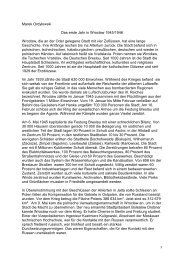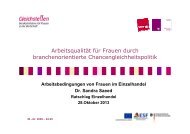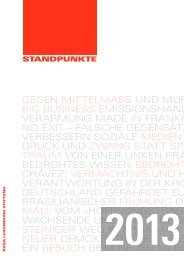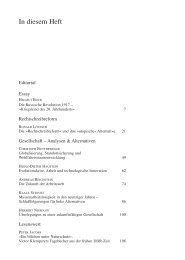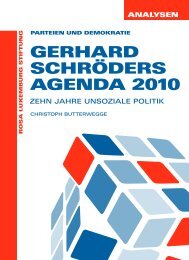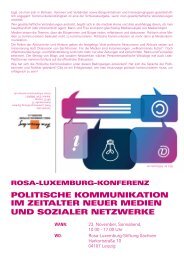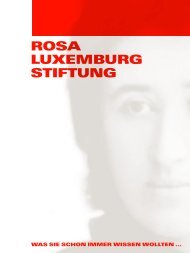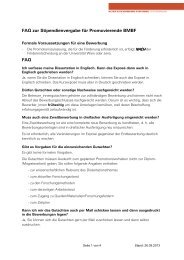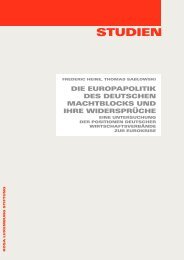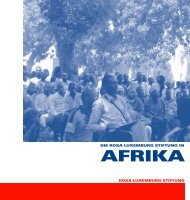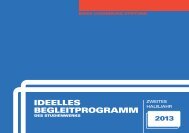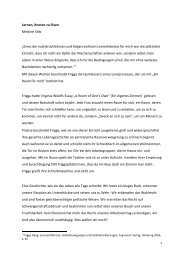The Left in Europe - Rosa-Luxemburg-Stiftung
The Left in Europe - Rosa-Luxemburg-Stiftung
The Left in Europe - Rosa-Luxemburg-Stiftung
You also want an ePaper? Increase the reach of your titles
YUMPU automatically turns print PDFs into web optimized ePapers that Google loves.
education: most SP voters are people with lower secondary education<br />
(Spier 2008: 112).<br />
Members<br />
Exact data on membership structure, on the other hand, are hard to come<br />
by, s<strong>in</strong>ce no academic studies have yet been carried out, and <strong>in</strong>ner-party<br />
<strong>in</strong>formation is not made freely available to outsiders. S<strong>in</strong>ce the second legislative<br />
period, however, the membership structure has changed to the extent<br />
that the proportion of university graduates has <strong>in</strong>creased. This development<br />
ma<strong>in</strong>ly concerns the office-holders <strong>in</strong> Parliament, Senate and National<br />
Executive. (Kagie 2006: 143, 136) Once the party had a larger number<br />
of seats <strong>in</strong> both chambers the number of those who did not have to work<br />
their way up through the entire party organization from the local to the parliamentary<br />
level naturally grew.<br />
<strong>The</strong> SP <strong>in</strong>cludes <strong>in</strong> its ranks Trotskyites, social-reformer Christians,<br />
creative artists and former members of the CPN, GroenL<strong>in</strong>ks and PvdA (cf.<br />
Zonneveld 2007) as well as activists from social movements, such as the<br />
peace, antimilitarist, anti-nuclear, environmental and anti-globalization<br />
movements. Its social-ethical humanism has found a programmatic and<br />
practical expression <strong>in</strong> the person of the theological maverick and SP member<br />
Huub Oosterhuis, a prom<strong>in</strong>ent <strong>in</strong>tellectual pioneer of Christian socialism<br />
<strong>in</strong> <strong>The</strong> Netherlands: <strong>The</strong> <strong>in</strong>troduction to the book “Socialisme – What’s<br />
left?” (2004), which conta<strong>in</strong>s fragments of the Communist Manifesto and<br />
other economic and philosophical works, was written by Oosterhuis under<br />
the head<strong>in</strong>g: “<strong>The</strong> Revolution of the Bible” (cf. Oosterhuis 2004: 9 ff.).<br />
Key theses<br />
Netherlands<br />
S<strong>in</strong>ce the “landslide” the parties to the left of the Social Democracy face<br />
the challenge of a new party be<strong>in</strong>g founded. In view of the German experience<br />
it might be worth while to take a closer look at the SP, as both Germany<br />
and <strong>The</strong> Netherlands have <strong>in</strong> common the fact that for a long time no<br />
such left-w<strong>in</strong>g party was able to establish itself <strong>in</strong> either country. In the<br />
Federal Republic the PDS merged <strong>in</strong> June 2007 with Labour and Social<br />
Justice – <strong>The</strong> Electoral Alternative (WASG) to form the DIE LINKE<br />
(THE LEFT) party, and this comb<strong>in</strong>ation of East German “mass party” and<br />
West German ex-Social Democrats and left-w<strong>in</strong>g trade unionists has managed<br />
to get elected to the regional parliaments <strong>in</strong> four West German federal<br />
44



